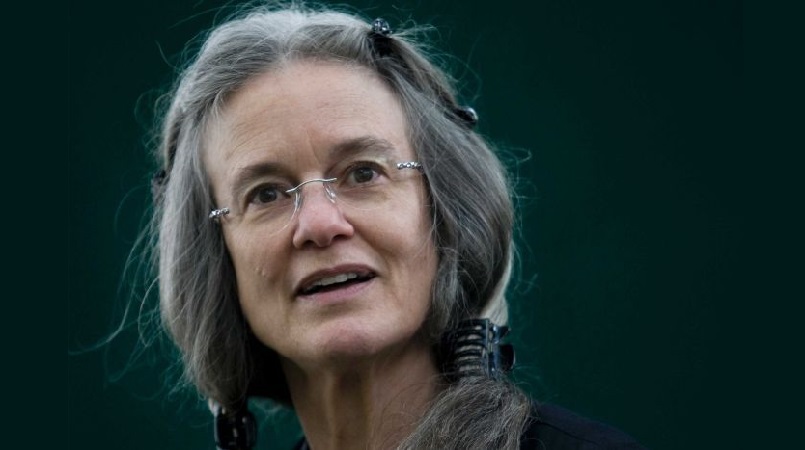
Ode to the Hymen, Ode to the Clitoris, A Celibate's Ode to Balls, Blow Job Ode: these are not the subjects we expect women in their 70s to be paying attention to, let alone writing about.
But they all feature in Odes, the latest collection from Sharon Olds.
In recent years, the American poet has found critical acclaim.
She won the Pulitzer Prize and the TS Eliot Prize in 2013 for Stag's Leap, written when her husband left her after almost three decades of marriage.
Last year, Olds was awarded the Academy of American Poets' Wallace Stevens Award, which came with a $US100,000 cheque and acknowledgement she was an "American master, and a national treasure".
'These were my passionate subjects'
This is not the way Olds's poetry was received when she first began submitting it to magazines 40 years ago.
"My work was not greeted with universal enthusiasm; it's quite true," she says, laughing.
"It seemed tasteless to many. I wasn't doing it just to be shocking. These were my passionate subjects: parents, children, sexual partner, married sexual love."
Olds wrote directly about her giddy delight in sex, in the pleasure she and her husband took from one another's bodies. Take this excerpt from the poem You Kindly:
close to me, delicate blunt
touch of your hard penis in long
caresses down my face,
With what she jokingly refers to in Odes as "my heteromania talking", Olds continues to celebrate the intense physical and emotional connection of lovemaking.
But she also revels in its bawdy, comic aspects; take Blow Job Ode from this latest collection, which begins: "I never thought of it as a line / of work."
'I have done what you wanted to do, Walt Whitman'
For a woman to write this explicitly about sex shocked many of Olds's early readers, but perhaps even more unsettling is the way her poetry mixes the erotic and the maternal.
Olds's writing ranges across these subjects, sometimes in the one poem, acknowledging that it is the same body that experiences orgasm, pregnancy, birth, and breastfeeding; the same hand that caresses a lover, washes a baby, and writes poem.
Being a mother gave Olds a kind of fierce entitlement to stand shoulder to shoulder with her male predecessors:
I have done what you wanted to do, Walt Whitman,
Allen Ginsberg, I have done this thing,
I and the other women this exceptional
act with the exceptional heroic body,
this giving birth, this glistening verb,
and I am putting my proud American boast
right here with the others.
From The Language of the Brag
While Olds' writing has always drawn on her most intimate experiences of family, she used to deflect biographical questions by saying, "I have taken a vow not to talk about that."
"[It's] a kind of cheesy way to handle the problem," she acknowledges.
These demurrals, though, were blown out of the water with the publication of Stag's Leap, which she summarises as "a book of the end of a long marriage".
The book is saturated with intense feeling but uses the structure and shape of poetic form to hold that emotion; to read it is a raw experience but also a redemptive one.
Olds held off publishing the book for 15 years so as to allow her children to make their own interpretation of their parents' separation, but since its release has been "hugely touched" by readers' responses.
"The theme of this book," she notes wryly, "is a familiar theme."
'We want to be useful with our poems'
Writing, even about the most painful things, is a reward unto itself for Olds: "To do the making is a huge pleasure, it's like a basketball player or anyone who likes doing what they do."
But for Olds, poetry is not primarily personal — she emphasises that poets publish because they want to connect with others.
"I think of poetry as a social art and we want to help people. We want to be useful with our poems."
It's poignant to hear a poet speak this way, because poetry occupies such a strange place in our culture.
Poetry is revered: it's what we reach for at our most significant moments, at every wedding and funeral. But poets are derided: imagine the reaction to introducing yourself as a poet at a party.
Speaking to the ABC last year, American poet Ben Lerner said the job title brought a conflicted social status. On the one hand, poets are celebrated as expressing the deepest human truths; on the other, they are mocked as self-important tossers.
Lerner's explanation of this conflict is psychoanalytical: it's because we want so much from poetry that we reject it before it disappoints us.
And it's true that there is something particularly awful about a bad poem.
But when a poet gets it right, as Olds does when writing on her "passionate subjects", we see ourselves in a clearer light, and there is nothing more useful.
